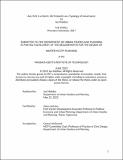Any Port in a Storm: UK Freeports as a Typology of Governance
Author(s)
Maddox, Jay
DownloadThesis PDF (1.379Mb)
Advisor
Jackson, Jason
Terms of use
Metadata
Show full item recordAbstract
In 2019, the United Kingdom announced a new initiative to set up several free trade zones across its four nations. While many analysts have viewed freeports through the lens of the UK's messy divorce from the European Union, it is crucial to understand the policy in the context of the country's regional planning and local development agenda. I argue that the freeport program represents an experimental typology of local governance developed by central authorities. By extending a novel combination of benefits and powers to local governmental bodies, this typology seeks to enable self-propelled “growth” and revitalization that isn’t depended on financial transfers from the central government. In the highly centralized context of England, the freeport governance typology does this by transforming local governmental bodies into empowered economic actors. Far from circumventing central government control, freeports are a centrally guided attempt to create a new form of governance that redefines the role of local and regional authorities. Lastly, I argue that this typology must first be understood as an amalgamation of several regulatory and fiscal features that have been developed over several decades beginning with the election of Margaret Thatcher.
Date issued
2023-06Department
Massachusetts Institute of Technology. Department of Urban Studies and PlanningPublisher
Massachusetts Institute of Technology